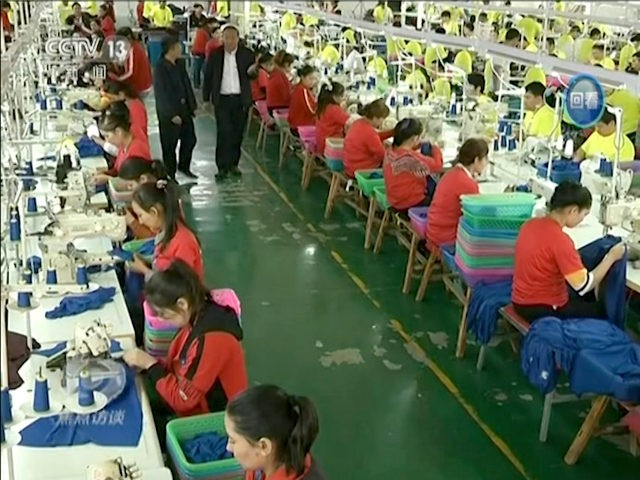U.S. Customs and Border Protection (CBP) issued a notice on Tuesday that accused a Chinese government company of using “convict, forced, or indentured labor” in Inner Mongolia to manufacture products that could be exported to the United States.
Specifically, the U.S. Department of Homeland Security (DHS) has determined that “stevia extracts and derivatives, mined, produced, or manufactured in the People’s Republic of China by the Inner Mongolia Hengzheng Group Baoanzhao Agriculture, Industry, and Trade Co., Ltd. (also referred to herein as ‘Baoanzhao’) with the use of convict, forced or indentured labor, are being, or are likely to be, imported into the United States.”
“CBP has determined that there is sufficient evidence to support the finding that Baoanzhao is a prison/forced labor facility and that stevia extracts and derivatives mined, produced, or manufactured by Baoanzhao are likely being imported into the United States,” the notice said.
“Today’s finding tells U.S. importers who fail to eliminate forced labor from their supply chains that their shipments may be subject to seizure and forfeiture. We hope this action encourages importers to take a close look at their supply chains to ensure that they meet the humane and ethical standards of the United States Government,” said Brenda Smith, Executive Assistant Commissioner of the agency’s Office of Trade.
The CBP investigation of Baoanzhao was launched after a non-governmental organization (NGO) forwarded allegations of forced labor sometime before May 2016, when CBP issued a Withhold Release Order (WRO) against Baonazhao products. The agency did not reveal the identity of the NGO or discuss the specific evidence it provided, but it said its own investigation produced “conclusive evidence” that the Chinese operation used forced labor.
In August 2020, CBP collected $575,000 in penalties from an import company called Pure Circle USA because it purchased at least 20 shipments of stevia from Baoanzhao in defiance of the May 2016 WRO. Pure Circle USA denied that it was knowingly importing forced labor products and agreed to a settlement that was only a fraction of the fines originally proposed by CBP, saying it wished to avoid “extensive litigation requiring travel to China during the COVID-19 [Chinese coronavirus] pandemic.”
On that occasion, CBP said it had issued 11 WROs related to products made with forced labor since 2019, four of them directed against Chinese imports. The penalties assessed against Pure Circle USA were the first collected under the Trade Facilitation and Trade Enforcement Act of 2015.
“We’ve had a very active year this year in terms of issuing withhold release orders,” Smith told Voice of America News (VOA) after the August 2020 penalties were announced. Other actions undertaken against Chinese imports for using forced labor included sanctions against computer manufacturer Lenovo, which supplies computers to American public schools, and clothing companies suspected of using forced labor from the Uyghur Muslims of Xinjiang province – including products made from human hair.
Smith told VOA that the bar was raised for importers to prove their goods are not made with forced labor because CBP wants them to investigate their supply chains more carefully.
“Our expectation is that they will be looking not only at the supplier that they buy directly from, but, for example, the supplier’s supplier. So if there is a shipment of apparel garments that comes into the United States and that the importer that brings it into the United States will not only be looking at who makes that garment, but who makes the fabric or who grows the cotton that goes into the fabric,” she explained.
The South China Morning Post (SCMP) noted on Thursday that Baoanzhao’s parent company, the Inner Mongolia Hengzheng Industrial Group, is a “wholly state-owned enterprise.”
“Official financial records from 2017 listed on the Inner Mongolia autonomous region’s government website indicate the Hengzheng Industrial Group operates under the jurisdiction of the Inner Mongolian prisons administration,” the SCMP reported.

COMMENTS
Please let us know if you're having issues with commenting.